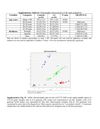 August 2023 in “Journal of Student Research”
August 2023 in “Journal of Student Research” Human hair keratin mixed with rubber slightly improves its strength and biodegradability.
October 2021 in “Case Reports in Dermatology” Patients and doctors often differ in assessing hair loss severity, so treatment should be personalized.
1 citations,
January 2023 in “Journal of Obstetrics and Gynaecology” High DHEA and short cervical length in women with PCOS and recurrent miscarriages may harm pregnancy outcomes.
22 citations,
March 2021 in “Materials Today Bio” Scaffold-based strategies show promise for regenerating hair follicles and teeth but need more research for clinical use.
 September 2024 in “World Journal of Clinical Oncology”
September 2024 in “World Journal of Clinical Oncology” Chemotherapy with docetaxel and cisplatin can cause severe low potassium, requiring careful monitoring and treatment.
 17 citations,
December 2020 in “Journal of Genetic Counseling”
17 citations,
December 2020 in “Journal of Genetic Counseling” Genetic counselors should be culturally skilled and aware of transgender patients' unique health risks and needs.
 April 2023 in “Medizinische Genetik”
April 2023 in “Medizinische Genetik” New gene discoveries have improved diagnosis and treatment for skin and hair disorders, but more research is needed to fully understand them.
 4 citations,
February 2015 in “Journal of Clinical Laboratory Analysis”
4 citations,
February 2015 in “Journal of Clinical Laboratory Analysis” A genetic variant in the androgen receptor gene increases heart disease risk in women but not in men.
44 citations,
January 1999 in “Advances in pharmacology” The document concludes that the androgen receptor's structure and function are complex, affecting how it regulates genes and is involved in diseases like prostate cancer.
 26 citations,
September 2020 in “Journal of the European Academy of Dermatology and Venereology”
26 citations,
September 2020 in “Journal of the European Academy of Dermatology and Venereology” A certain genetic variant in the androgen receptor may predict the severity of COVID-19 in men.
 7 citations,
July 2020 in “Immunological Investigations”
7 citations,
July 2020 in “Immunological Investigations” The rs231775 genetic variant is linked to a higher risk and severity of Alopecia Areata in males.
October 2021 in “QJM: An International Journal of Medicine” Avoiding smoking, stress, obesity, and poor diet may help reduce hair loss in young Egyptian males.
 December 2024 in “Livers”
December 2024 in “Livers” Recognizing rare causes of MASLD is crucial for effective treatment and preventing complications.
 September 2022 in “bioRxiv (Cold Spring Harbor Laboratory)”
September 2022 in “bioRxiv (Cold Spring Harbor Laboratory)” The research provided new insights into the genetic factors contributing to hair loss and skin conditions by analyzing individual cells from the human scalp.
 29 citations,
March 2019 in “British Journal of Dermatology”
29 citations,
March 2019 in “British Journal of Dermatology” Acne is significantly influenced by genetics, and understanding its genetic basis could lead to better, targeted treatments.
 12 citations,
February 2021 in “Translational Psychiatry”
12 citations,
February 2021 in “Translational Psychiatry” Researchers found two new genetic variants linked to Alzheimer's disease.
2 citations,
October 2018 in “Skin appendage disorders” A boy's hair that was frizzy and hard to comb returned to normal after 9 months, possibly due to genetic factors.
75 citations,
October 2012 in “Journal of Investigative Dermatology” Alopecia areata can be triggered by specific immune cells without genetic or environmental factors.
 34 citations,
October 2011 in “Pathology Research International”
34 citations,
October 2011 in “Pathology Research International” Behçet's Disease may be caused by genetic and environmental factors leading to abnormal immune responses, and stress management and new treatments could improve patient outcomes.
 29 citations,
November 2022 in “Nature Medicine”
29 citations,
November 2022 in “Nature Medicine” Genetic variations greatly affect individual metabolism and can impact health and disease risk.
1 citations,
January 2022 in “Food & Function” Certain Egyptian Sabal fruit extracts may help treat anti-androgenic diseases like benign prostatic hyperplasia.
 87 citations,
May 2012 in “PLOS Genetics”
87 citations,
May 2012 in “PLOS Genetics” Six new genetic regions linked to early hair loss also connect to Parkinson's disease and prostate cancer, possibly leading to new treatments.
 36 citations,
March 2019 in “European Journal of Human Genetics”
36 citations,
March 2019 in “European Journal of Human Genetics” The research found genetic differences in identical twins that could explain why one twin has a disease while the other does not.
23 citations,
October 1996 in “Dermatologic clinics” Genes affect cytokine production, which can influence chronic diseases, and certain interventions may help prevent related molecular damage.
 1 citations,
September 2019 in “Practica medicală”
1 citations,
September 2019 in “Practica medicală” Hair loss is linked to heart disease and metabolic syndrome, and while current treatments vary in effectiveness, more research is needed for better solutions.
 January 2022 in “Function”
January 2022 in “Function” Studying rare genetic disorders can help us understand and treat common diseases better.
 80 citations,
March 2004 in “Neuropediatrics”
80 citations,
March 2004 in “Neuropediatrics” Coats' Plus is a genetic disorder with eye abnormalities, brain calcification, poor growth, bone and skin issues, and movement disorders.
21 citations,
January 2021 in “Frontiers in Pharmacology” Thiopurines help treat IBD but require genetic testing to avoid side effects.
 May 2022 in “Journal of Education, Health and Sport”
May 2022 in “Journal of Education, Health and Sport” Skin diseases like psoriasis, lupus, and others can increase heart disease risk due to factors like chronic inflammation and genetic susceptibility.

Alopecia areata, a type of hair loss, may be passed through T cells and has genetic links, while treatments vary in effectiveness. Male pattern baldness can be treated with finasteride and is influenced by androgens in hair follicles.




















